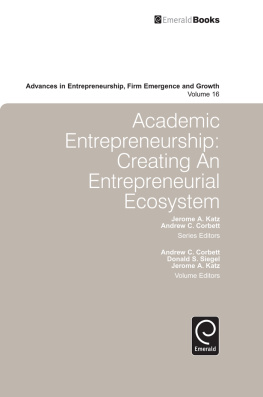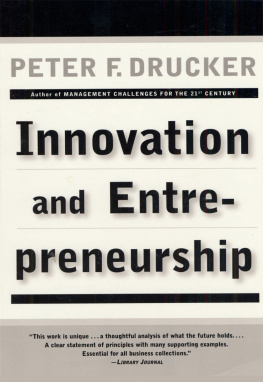REFERENCES
Abernethy, M. A., & Brownell, P. (1997). Management control systems in research development organizations: The role of accounting, behavior and personnel controls. Accounting, Organizations and Society, 22(3/4), 233248.
Adamides, E. D., & Karacapilidis, N. (2006). Information technology support for the knowledge and social processes of innovation management. Technovation, 26(1), 5059.
Ahn, M. J., & Meeks, M. (2008). Building a conducive environment for life science-based entrepreneurship and industry clusters. Journal of Commercial Biotechnology, 14(1), 2030.
Ajzen, I. (1985). From intentions to actions: A theory of planned behavior. In Kuhl J., Beckmann J. (Eds.), Action control (pp. 1139). Berlin, Germany: Springer.
Ajzen, I. (1991). The theory of planned behavior. Organizational Behavior and Human Decision Processes, 50(2), 179211.
Ajzen, I., & Fishbein, M. (1977). Attitudebehavior relations: A theoretical analysis and review of empirical research. Psychological Bulletin, 84(5), 888.
Almobaireek, W. N., Alshumaimeri, A. A., & Manolova, T. S. (2011). Entrepreneurial intentions among Saudi University students. The role of motivations and start-up problems. International Journal of Management and Business, 2(2), 5165.
Almobaireek, W. N., & Manolova, T. S. (2012). Who wants to be an entrepreneur? Entrepreneurial intentions among Saudi university students. African Journal of Business Management, 6(11), 40294040.
Amabile, T., Conti, R., Coon, H., Lazenby, J., & Herron, M. (1996). Assessing the work environment for creativity. Academy of Management Journal, 39(5), 11541184.
Anggadwita, G., & Dhewanto, W. (2016). The influence of personal attitude and social perception on women entrepreneurial intentions in micro and small enterprises in Indonesia. International Journal of Entrepreneurship and Small Business, 27(23), 131148.
Anthony, R. N. (1965). Planning and control systems: A framework for analysis [by]. Cambridge, MA: Division of Research, Graduate School of Business Administration, Harvard University.
Apostolou, D., & Mentzas, G. (2003). Experiences from knowledge management implementations in companies of the software sector. Business Process Management Journal, 9(3), 354381.
Araujo, L., Dubois, A., & Gadde, L. E. (2003). The multiple boundaries of the firm. Journal of Management Studies, 40(5), 12551277.
Atkinson, J. W. (1964). An introduction to motivation. Oxford: Van Nostrand.
Bailetti, A. J., & Bot, S. D. (2013). An ecosystem-based job-creation engine fuelled by technology entrepreneurs. Technology Innovation Management Review, February, 3140.
Baron, R. A. (2008). The role of affect in the entrepreneurial process. Academy of management Review, 33(2), 328340.
Baron, R. A., & Henry, R. A. (2011). Entrepreneurship: The genesis of organizations. In S. Zedeck (Ed.), APA Handbooks in Psychology. APA handbook of industrial and organizational psychology, Vol. 1. Building and developing the organization (pp. 241273). Washington, DC: American Psychological Association.
Baum, J. R., & Locke, E. A. (2004). The relationship of entrepreneurial traits, skill, and motivation to subsequent venture growth. Journal of Applied Psychology, 89(4), 587.
Bay, D., & Daniel, H. (2003). The theory of trying and goal-directed behavior: The effect of moving up the hierarchy of goals. Psychology & Marketing, 20(8), 669684.
Berry, A. J., Coad, A. F., Harris, E. P., Otley, D. T., & Stringer, C. (2009). Emerging themes in management control: A review of recent literature. The British Accounting Review, 41, 220.
Bhide, A. V. (2000). The origin and the evolution of new business. New York, NY: Oxford University Press.
Binder, M., & Coad, A. (2013). Life satisfaction and self-employment: A matching approach. Small Business Economics, 40(4), 10091033.
Bird, B. (1988). Implementing entrepreneurial ideas: The case for intention. Academy of Management Review, 13(3), 442453.
Bisbe, J., & Otley, D. (2004). The effects of the interactive use of management control systems on product innovation. Accounting, Organizations and Society, 29, 709737.
Bischoff, K. M., Gielnik, M. M., Frese, M., & Dlugosch, T. (2013). Limited access to capital, start-ups, and the moderating effect of an entrepreneurship training: integrating economic and psychological theories in the context of new venture creation (summary). Frontiers of Entrepreneurship Research, 33(5), 3.
Bontis, N., Dragonetti, N. C., Jacobsen, K., & Roos, G. (1999). The knowledge toolbox: A review of the tools available to measure and manage intangible resources. European Management Journal, 17(4), 391402.
Bourls, R., & Cozarenco, A. (2017). Entrepreneurial motivation and business performance: Evidence from a French microfinance institution. Small Business Economics, 51, 943963.
Brandl, J., & Bullinger, B. (2009). Reflections on the societal conditions for the pervasiveness of entrepreneurial behavior in Western societies. Journal of Management Inquiry, 18(2), 159173.
Brinckmann, J., Grichnik, D., & Kapsa, D. (2010). Should entrepreneurs plan or just storm the castle? A meta-analysis on contextual factors impacting the business planningperformance relationship in small firms. Journal of Business Venturing, 25(1), 2440.
Broadbent, J., & Laughlin, R. (1997). Developing empirical research: An example informed by a Habermasian approach. Accounting, Auditing and Accountability Journal, 10(5), 622648.
Broadbent, J., & Laughlin, R. (2013). Accounting control and controlling accounting: Interdisciplinary and critical perspectives. Bingley: Emerald Publishing Limited.
Broadbent, M. (1997). The emerging phenomenon of knowledge management. The Australian Library Journal, 46(1), 624.
Bromwich, M., & Bhimani, A. (1994). Management accounting pathways to progress. London: Chartered Institute of Management Accountants.
Brush, C. G., Greene, P. G., & Hart, M. M. (2001). From initial idea to unique advantage: The entrepreneurial challenge of constructing a resource base. Academy of Management Perspectives, 15(1), 6478.
Bruyat, C., & Julien, P. A. (2001). Defining the field of research in entrepreneurship. Journal of Business Venturing, 16(2), 165180.
Burke, A., Fraser, S., & Greene, F. J. (2010). The multiple effects of business planning on new venture performance. Journal of Management Studies, 47(3), 391415.
Busenitz, L. W., West, G. P., III, Shepherd, D., Nelson, T., Chandler, G. N., & Zacharakis, A. (2003). Entrepreneurship research in emergence: Past trends and future directions. Journal of Management, 29(3), 285308.
Canonico, P., De Nito, E., & Mangia, G. (2012). Control mechanisms and knowledge integration in exploitative project teams: A case study from the coal fired power plant industry. Journal of Knowledge Management, 16, 538549.
Carey, T. A., Flanagan, D. J., & Palmer, T. B. (2010). An examination of university student entrepreneurial intentions by type of venture. Journal of Developmental Entrepreneurship, 15(04), 503517.
Carsrud, A., & Brnnback, M. (2011). Entrepreneurial motivations: What do we still need to know? Journal of Small Business Management, 49(1), 926.












